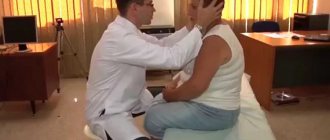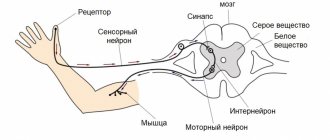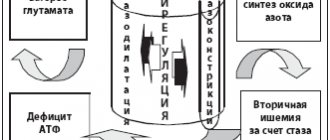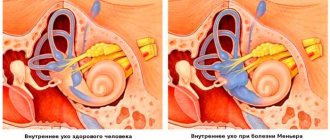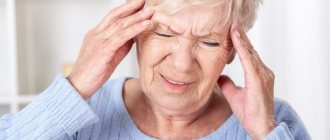Complaints of dizziness when bending over can be present in a variety of pathologies. But in the vast majority of cases, this is a classic symptom of circulatory or innervation disorders. Also, a malfunction of the vestibular apparatus may manifest itself in a similar way. But, again, this may be directly related to pathologies of blood vessels, cranial nerves and the cervical spine.
Dizziness when tilting the head is a manifestation of oxygen deficiency due to a decrease in the level of blood flow through the cerebral blood vessels. Brain tissues are highly sensitive to glucose and oxygen deficiency. They are delivered by red blood cells through arterial blood flow.
Blood supply to the brain structures is carried out using four paired arteries. Two sleepy ones are located on the sides of the neck. The two posterior vertebrates pass within the uncovertebral processes along the lateral sides of the cervical vertebral bodies. The carotid arteries supply blood to the lateral and anterior lobes of the brain. The posterior vertebral arteries are responsible for the blood supply to the optic and auditory nerves, the vestibular apparatus, and the posterior lobes of the brain.
When blood flow is disrupted, the following occurs:
- free radicals and breakdown products accumulate in cells;
- ischemia begins at the cellular level;
- When a significant number of cells die, a cerebral infarction develops.
The first clinical sign of cerebrovascular insufficiency is dizziness when tilting the head in different directions. We will tell you what reasons can provoke this condition in the article we bring to your attention. It also describes the main clinical symptoms, when they appear, you should immediately call an ambulance. If you experience dizziness, try to see a neurologist as soon as possible.
In Moscow, you can make an appointment right now with an experienced neurologist in our manual therapy clinic. The first consultation is provided to each client completely free of charge. During the appointment, the doctor will conduct an examination and make a preliminary diagnosis. If necessary, he will recommend additional examinations. After an accurate diagnosis is made, the patient will be prescribed an individual course of therapy.
Causes of dizziness when tilting your head down
Dizziness when tilting your head down is a sign of vertebrobasilar insufficiency. This is a pathological condition in which, due to changes in the course of the posterior vertebral arteries, any change in the position of the head provokes a lack of blood supply to the structures of the brain.
The main cause of dizziness when tilting the head is degenerative dystrophic changes in the cartilaginous tissues of the intervertebral discs. This is osteochondrosis and its negative consequences, such as instability of the position of the vertebral bodies, protrusion, extrusion and disc herniation.
Let's try to analyze these causes of dizziness when bending down in more detail. Let's start with the principle of blood supply to cerebral structures. Arterial blood enters the systemic circulation from the left ventricle. Movement along the aorta begins. Then branching into smaller arteries occurs. One of the branches of the subclavian artery goes to the space between the sixth and seventh cervical vertebrae. Here it comes out and, moving along the uncovertebral hook-shaped processes, reaches the oval opening in the cranium. This is where the extracranial section of the artery ends. After entering the cranium, the intracranial section of the artery begins. It can also be subject to stenosis due to some negative factors.
The cervical spine is characterized by increased lability, due to which a person can make a wide variety of head movements. Neck mobility is ensured by the special structure of the vertebral bodies and relatively high intervertebral discs. There is no disc between the first and second cervical vertebrae. They are connected to each other using a joint. This provides greater mobility, but can also cause a lot of trouble. Very often, modern people are diagnosed with subluxation or dislocation of the first cervical vertebra. This has an extremely negative impact on the state of brain structures. Such people often suffer from symptoms of increased intracranial pressure.
The cervical vertebrae have three types of processes:
- arcuate - they, together with the vertebral bodies, form the oval opening of the spinal vertebral canal;
- spinous - responsible for protecting and ensuring the performance of the locomotor system;
- uncovertebral - form a kind of canal along the lateral surfaces of the cervical vertebrae to protect the posterior vertebral arteries.
All structural tissues of the cervical spine are balanced and provide complete protection to the spinal cord structures, radicular nerves and cerebral blood vessels.
What happens with the development of cervical osteochondrosis:
- the cartilaginous tissues of the intervertebral discs do not have their own circulatory network; they receive fluid and nutrients dissolved in it only with the active contractile work of the surrounding muscles;
- if a person is engaged in sedentary work with prolonged tension in the neck muscles, then the diffuse nutrition of the cartilage tissue of the fibrous ring is disrupted;
- it begins to take fluid from the nucleus pulposus located inside it;
- the corpus pulposum loses its mass and loses its ability to maintain the normal height of the intervertebral disc;
- this creates conditions for instability of the position of the vertebral bodies, they begin to shift relative to their axis;
- pressure is exerted on the radicular nerves and their branches;
- in response, an inflammatory reaction develops and a pain syndrome appears with muscle fiber tension;
- it fixes the incorrect position of displaced vertebral bodies;
- against this background, there is a change in the patency of the posterior vertebral arteries towards narrowing;
- The structures of the brain and vestibular apparatus do not receive sufficient arterial blood and the person experiences so-called orthostatic dizziness.
There are other causes of dizziness when tilting the head down, in particular, they include:
- use of certain medications without a doctor’s prescription;
- intoxication, including alcohol or nicotine poisoning (after smoking);
- inflammation of the neck muscles in the area of the carotid or posterior vertebral arteries;
- heart and vascular failure;
- atherosclerosis of cerebral vessels with the formation of cholesterol plaques;
- diabetes mellitus accompanied by diabetic angiopathy;
- damage to paired cranial nerves, causing spasm of blood vessels;
- high levels of cortisol, adrenaline and other stress hormones in the human body;
- arterial hypertension;
- liver and kidney failure;
- high level of intracranial pressure;
- tumor processes;
- inflammation of the middle ear, etc.
Only an experienced doctor can exclude all possible causes of dizziness when tilting the head. Therefore, do not ignore this sign, but urgently make an appointment with a neurologist. Remember that in some cases this symptom may indicate the development of an acute cerebrovascular accident. In the event of a stroke, timely medical care allows a person to fully maintain their ability to work and prevent the development of paralysis.
Dizziness as a symptom of illness
Dizziness when getting out of bed may be accompanied by other specific symptoms that vary depending on the disease. This may include darkening of the eyes, nausea or vomiting, profuse sweating, fainting, and much more.
In this case, you will no longer be able to do without contacting a competent specialist.
What diseases cause you to feel dizzy when standing up?
- Ear diseases. The inner ear is one of the most important elements in the body. It is filled with liquid, with the help of which we accurately determine the position of our body in space. But when inflammation or injury to the ear occurs, the amount of fluid changes in volume and blood flow is disrupted. The pressure in the inner ear increases, which leads to dizziness, which is accompanied by illusory sounds, noise or ringing, congestion, and deafness. Such symptoms indicate infectious inflammation, traumatic brain injury to the temporal part, and a possible brain tumor.
- Dysfunction of the vestibular apparatus. As you know, it is this structure that provides a sense of balance. It transmits impulses to the brain about the position of the body in space. The brain responds by adjusting muscle function depending on body position. And if the vestibular apparatus does not function correctly, then you may feel dizziness and nausea.
- Cervical osteochondrosis. It is characterized by calcification of the intervertebral joints, which, when moving the head, can provoke stretching and damage to nerves and blood vessels. Because of this, the brain may not receive the required portion of oxygen, which will manifest itself as dizziness when getting out of bed. Attacks are observed during periods of exacerbation and are aggravated by hypothermia, excessive stress and long periods of sitting in a sitting position.
- Disturbances in brain activity can cause dizziness. This happens most often due to vascular dysfunction. With various types of brain anomalies, congenital or acquired, the vessels are no longer able to ensure the distribution of blood flow in the required volume and at the required speed. This leads to oxygen starvation. There may be several root causes: concussion, epilepsy, tumor, cerebral atherosclerosis. Dizziness during a concussion is the first symptom. Therefore, if you have a similar symptom, remember if you have had any head injuries recently. After all, a mild concussion can manifest itself after some time.
- Diseases of the cardiovascular system. Failure of the heart rhythm leads to ailments such as dizziness when rising from a horizontal position. At the same time, blood is not produced in the required volume, and its movement is intermittent. The required amount of oxygen is not delivered to the brain, which causes pre-fainting conditions. Causes: vegetative-vascular dystonia, heart disease, hypertensive crisis.
- Poisoning. General intoxication causes a painful condition, in particular accompanied by dizziness.
Dizziness with the diseases and injuries listed above is only their symptom. Therefore, the treatment process, as a rule, is aimed at combating not dizziness, but the pathology that caused it.
First, you need to contact a therapist who will prescribe tests and instrumental examinations. Based on their results, he will make a diagnosis or refer you to another doctor with a more narrow specialization.
When help is needed urgently
There are situations when a patient needs help urgently, otherwise he may begin to develop irreversible consequences. We are talking about a violation of cerebral circulation. It can be transient (transient) or permanent, ischemic or hemorrhagic.
With a transient disturbance of cerebral circulation, severe dizziness occurs when bending over, which completely disappears when the previous position of the skull is restored. It is due to the fact that when the position of the vertebral bodies changes, the movement of blood through the posterior vertebral arteries is disrupted. As a result, dizziness, nausea, throbbing headache, and spots in the eyes may occur. If such symptoms appear, a visit to a neurologist should be made within 72 hours. Each subsequent attack can lead to a full-fledged ischemic stroke of the brain.
It is worth considering that the causes of dizziness when bending over in women may be associated with menopausal hormonal changes in the body. The fact is that a certain balance of hormones guarantees reliable protection against myocardial ischemia and cerebral structures. Therefore, cerebral and coronary circulatory disorders are extremely rarely diagnosed in women of reproductive age. They practically never have strokes or heart attacks. The situation changes dramatically after a woman reaches the age when menopause occurs. Hormone levels change, processes begin that lead to changes in platelet aggregation. The blood becomes thick and viscous. The risk of sudden stroke or heart attack increases sharply.
Therefore, severe dizziness when tilting the head in a woman over 50 years of age is a reason to urgently call an ambulance team.
Severe dizziness when bending down may be accompanied by nausea and vomiting - these are signs of damage to brain structures. Pay attention to facial expressions - if an asymmetric contraction of the facial muscles is visible, then this is also a reason to urgently seek medical help. In principle, dizziness is an extremely dangerous clinical symptom. This is how various types of neoplasms begin to appear at an early stage. If you undergo diagnosis and treatment in a timely manner, the chances of recovery are very high. Therefore, do not ignore such symptoms, seek help from a neurologist.
Causes of pathology
The majority of cases in which dizziness occurs occurs due to the modern pace of life:
- lack of fresh air;
- constant stress;
- overwork;
- lack of a complete diet;
- lack of sleep;
- dehydration;
- taking medications;
- adrenaline release;
- flights;
- bad habits;
- during menstruation or after childbirth in women;
Elementary actions to eliminate provoking factors help eliminate morning discomfort and restore normal well-being.
Dizziness often plagues women during pregnancy.
A number of diseases as the cause of pathology
More significant reasons for the manifestation of discomfort are a number of dangerous diseases that do not have specific symptoms other than the symptoms described above.
- Disruption of the vegetative-vascular system (VSD syndrome). It is not an independent disease, but more often manifests itself as a consequence of malfunctions in the functioning of other organs and systems: endocrine, central nervous system, circulatory disorders, and cardiovascular pathologies.
- Coordination is also impaired in case of ear diseases. These include Meniere's syndrome, labyrinthitis, otitis media and middle ear injuries.
- Damage to the cardiovascular system: strokes, heart failure, anemia.
- Degenerative brain lesions. These are Huntington's chorea, Alzheimer's disease, Pick's disease and Parkinson's disease.
- Benign and oncological neoplasms in the brain.
- Migraines and cluster pain. The phenomenon occurs both when you get up and when you lie down. At the same time, women are more susceptible to migraines, and cluster pain occurs more often in men.
- Malfunction of the vestibular apparatus. Caused by damage to the vestibular nerve in the form of inflammation and neoplasms.
- Traumatic brain injuries and pathologies of the cervical spine.
- Recent blood loss and previous surgery.
- Poisoning.
Excessive physical activity, bad habits and injuries of various types provoke dizziness in 20% of men.
Cystitis - inflammation of the bladder mucosa - in women extremely often becomes chronic. It is quite difficult to treat this disease; even after a course of pills, the disease may return, but an integrated approach improves the prognosis for recovery. Read more in the article: “how to treat cystitis in women.”
Orthostatic hypotension as a cause of dizziness
A separate manifestation of orthostatic hypotension is distinguished. When getting out of bed the disease is accompanied by:
- attacks of nausea and vomiting;
- bleeding from the nose;
- increased heart rate;
- tinnitus;
- decreased blood pressure when getting out of bed;
- loss of balance;
- excruciating headaches.
Orthostatic hypotension is detected both through laboratory tests and at home. To do this, measure the pulse rate and blood pressure while lying down and when getting out of bed. If the indicators differ, a doctor's consultation is required.
The assessment of the orthostatic test is given in the table.
| Indicators | Satisfactory sample | Unsatisfactory sample |
| Heartbeat (rate) | increase in frequency by 11-18 beats | from 19 strokes |
| Autonomic reactions | not visible or indicated by sweating | sweating and tinnitus |
| Pulse pressure | increases or does not change | is decreasing |
| Systolic pressure | increases or does not change | decreases by 10-15 points |
| Diastolic pressure | increases or does not change | rises |
The results of the study predetermine further actions: contacting a therapist or no therapeutic measures.
What to do if you feel dizzy when tilting your head
If you experience dizziness when bending forward, the first thing to do is to stabilize yourself and eliminate the possibility of falling. Therefore, if possible, you need to sit or lie down. If this is not possible, lean your back against a vertical surface. Start breathing deeper. Release the pressure from your collar or tie. It is important to provide the brain with a sufficient amount of arterial blood.
If dizziness occurs repeatedly when tilting your head forward or backward, then get examined:
- make an appointment with a neurologist;
- take an x-ray of the cervical spine;
- undergo an MRI and ultrasound examination;
- donate blood for a biochemical analysis to determine the level of sugar, cholesterol, protein, lipids, urea and creatinine.
After making an accurate diagnosis, the neurologist can prescribe a consultation with an angiosurgeon, therapist, etc. Treatment is carried out for the disease that causes dizziness when tilting the head back or forward. By itself, this clinical symptom is useless to treat. Such measures will not lead to anything good. We need to find the cause and eliminate it. Only in this case the patient receives guaranteed relief from the unpleasant manifestations of the disease.
If you are periodically bothered by dizziness when tilting and turning your head, we recommend making an appointment with a neurologist at our manual therapy clinic in Moscow right now. Fill out the doctor appointment form located further down the page. The administrator will contact you and agree on all the details of the upcoming visit to the doctor.
